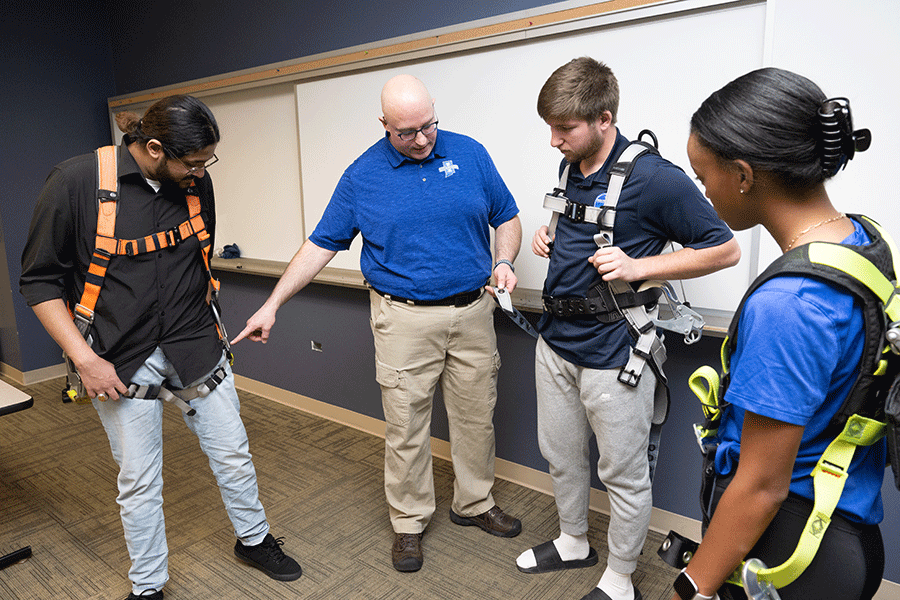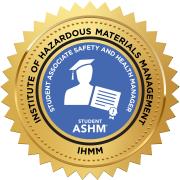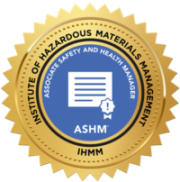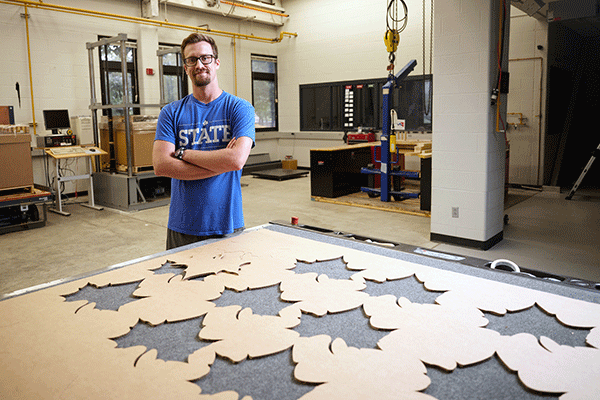Why Earn a Bachelor’s Degree in Safety Management at Indiana State?
As a safety management major at Indiana State, you can learn how to keep workers and workplaces safe, how to promote healthier workplaces, and how to reduce organizational risks and harm to the environment while preparing for a rewarding industry career. Indiana State University is one of the first universities in the United States to offer a bachelor’s degree in safety management.
This program is available on campus or online. Online students are required to complete a one-week residency on the Indiana State University campus during the summer of their junior or senior year.

Protect Others
Through coursework, labs, and internships, you will become qualified to design, develop, and implement environmental health and safety programs for a variety of workplace environments. You will also learn to communicate about environmental health and safety-related topics, identify technical problems, conduct experiments, test hypotheses, and use scientific judgment to make conclusions for the safety and well-being of others and the environment.
Learn from Our Excellent Faculty
Our professors bring extensive industry experience to every class they teach. They also incorporate aspects of their ongoing research into discussions about environmental health and safety management topics and current best practices.
Our small class sizes ensure that instructors are able to provide personalized feedback and one-on-one mentorship. And, as a student in the safety management program, you may have a chance to participate in faculty-led research projects.
Receive Expert Assistance in Our Labs
Practice your skills and apply your knowledge in our state-of-the-art laboratories equipped with leading industry software. Safety management students conduct research inside an industrial hygiene lab equipped with instruments and technology used to evaluate levels of occupational exposures to chemicals and other hazardous substances. This dynamic learning environment provides you with practical experience and prepares you for internships and post-graduation employment.
What You'll Learn in the Safety Management Program
The BS in safety management includes studies in the management, evaluation, and control of safety and health hazards in workplace environments. Our safety management program helps you identify and solve technical and scientific problems by applying mathematics and science-related principles to real-world situations.
You will also complete an internship. Our program offers paid experiences at manufacturing, healthcare, power and energy, refinery facilities, insurance companies, and government agencies. Our students have previously completed internships at companies including Alcoa, Cargill, Eli Lilly and Company, General Electric, Pfizer, Inc., and Toyota, among others.

Transfer Credit
Indiana State University accepts credit from regionally accredited colleges and universities within the United States, and from selected schools located outside the United States. Credit also may be granted for military training and experience. Previously earned college credit can be applied toward completion of the program per Indiana State's transfer guidelines.
Transfer GuidelinesRecognitions and Designations
The Bachelor of Science in Safety Management program is recognized as a Qualified Academic Program (QAP) by the Board of Certified Safety Professionals. This designation allows our graduates to apply for the Graduate Safety Practitioner (GSP), which puts you one step closer to your Certified Safety Professional (CSP) certification.

The Institute of Hazardous Materials Management's Student Associate Safety & Health Manager (ST/ASHM™) credential recognizes students who wish to demonstrate their development of knowledge and skills in safety and health management in the workplace while pursuing their undergraduate or graduate degree. Student ASHMs are also eligible for the IHMM Dr. John H. Frick Memorial Scholarship, a $32,000 program to assist our student certificants with the costs of their education.
After Your Student ASHM designation, You Earn Your Associate Safety & Health Manager [ASHM] designation along with your degree.

IHMM’s Associate Safety and Health Manager (ASHM™) credential recognizes professionals who are recent bachelor’s degree graduates with a focus in health- and safety-related fields. This credential puts the holder on the fast-track to the Certified Safety and Health Manager (CSHM®) credential.
Career Possibilities for Safety Management Majors
Prepare for a successful career as an environmental health and safety specialist, safety specialist, environmental health and safety manager, safety manager, environmental manager, occupational health manager or industrial hygienist with a bachelor’s degree in safety management from Indiana State. Many of our students also pursue graduate study following graduation.

Learn from This Expert
“Safety management is a student-oriented program that highlights hands-on, experiential learning for our students.”
Safety management professor Farman A. Moayed, PhD, guides his students through research projects and internships in the safety management program.
Learn Prof. Moayed’s story.Accreditation
Indiana State University is accredited by the Higher Learning Commission.
The Safety Management Program at Indiana State University is one of the first to offer a bachelor's degree in the United States. The Safety Management undergraduate program is accredited by the Applied and Natural Science Accreditation Commission (ANSAC) of the Accreditation Board for Engineering and Technology (ABET). https://www.abet.org
* 415 N. Charles Street, Baltimore, MD 21201, (410) 347-7700
Program Educational Objectives (PEOs)
Below are the Program Educational Objectives (PEOs) that describe what graduates are expected to attain within a few years of graduation:
PEO 1 - Demonstrate knowledge and skills in the area of safety management;
PEO 2 - Communicate safety-related topics (orally and in writing) and work effectively both independently and in teams;
PEO 3 - Continue education and professional development; and
PEO 4 - Demonstrate ethical, social, and professional responsibility.
Student Outcomes (SOs)
Below are the Student Outcomes (SOs) that describe what graduates are expected to attain by the time of graduation:
(1) An ability to identify, formulate, and solve broadly defined technical or scientific problems by applying knowledge of mathematics and science and/or technical topics to areas relevant to the discipline;
(2) An ability to formulate or design a system, process, procedure or program to meet desired needs;
(3) An ability to develop and conduct experiments or test hypotheses, analyze and interpret data and use scientific judgment to draw conclusions;
(4) An ability to communicate effectively with a range of audiences;
(5) An ability to understand ethical and professional responsibilities and the impact of technical and/or scientific solutions in global, economic, environmental, and societal contexts; and
(6) An ability to function effectively on teams that establish goals, plan tasks, meet deadlines, and analyze risk and uncertainty.
Related Programs
-

Construction Management (BS)
Bachelor's
-

Supply Chain Management (BS)
Bachelor's
-

Manufacturing Engineering Technology (BS)
Bachelor's
